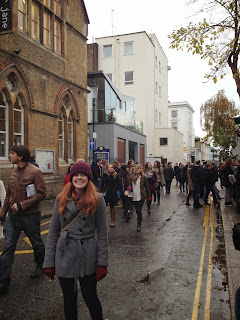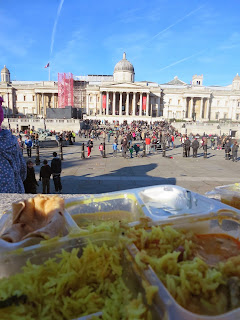Once again, I'm sorry it's taken me so long to update. I've made a promise to blog once a week, so my posts should be more regular.
Last week (November 3rd to 10th), both my parents AND Riley visited me! Even though I've been in London for just over a month, I was happy to see my parents and girlfriend. Plus, it was a great chance to explore more of the city. I made sure to get ahead on my work so I could spend time with my visitors.
 |
| View from atop St. Paul's |
My parents arrived first on Tuesday. We had dinner in Soho (my first time really exploring that neighborhood) and grabbed some gelato. My gelato was described as having pig's blood in it, and the server assured me it was actual pig's blood. I thought the flavor was quite tasty. On Wednesday night, we saw the musical
War Horse. It's based on the
movie and
book of the same name, although I'm familiar with neither. The most impressive part was the "puppet" they used for the horse. Three actors controlled a giant wooden horse frame by standing underneath it. They moved the legs and head, doing a terrific job of making you see the horse as a character and forget the actors underneath. We also saw
St. Paul's Cathedral, which remains my favorite destination in London. Although it costs a bit to tour, the fee is well worth it. In addition to stunning architecture, you can ascend to the top of the dome, providing a commanding view of the city. I might attend a service at some point, as they have an amazing pipe organ and choir (plus it's free when you're coming to worship!)
 |
| With my mom! Photo credit dad |
 |
| With my dad! Photo credit mom |
Riley arrived from Germany on Thursday, and despite our lack of working telephones and internet, we managed to find each other at the train station. Riley came to my swing dance class with me on Thursday night. Although we couldn't find a club hosting swing dancing after the lesson, it was fun to dance with her again after all this time! On Friday, we met back up with my parents for more touristy fun. We visited
Twinings Tea, one of Britain's oldest tea suppliers. A knowledgeable hostess offered us free tea samples and shared the history of tea in Britain and facts about tea in general. We learned about the role of tea in the Opium War in China as well as the secret to why Brits prefer milk with their tea. Apparently, when tea was first introduced on the island, most people could only afford very crappy stuff. As a result, they had to drown it in milk and sugar to make it palatable. By the time it reached other countries in the western world, quality had improved, but British taste stayed the same. I picked up a good English black tea, but I'll have to return to purchase one of their more unique teas. We then stopped by
the Cheshire Cheese, a historic pub in London, and my favorite so far. The pub had a cozy atmosphere, and we ended up getting into a conversation with some locals sitting next to us. It seemed like a place where Londoners come to relax after work. Next, we headed to the iconic
London Eye. I was expecting to be a little bored, but I ended up enjoying the experience more than I expected. The rotation doesn't take as long as some people warn, and if you go up on a clear night there really is plenty to see. Finally, we had dinner at the Indian restaurant
Mint Leaf. Unlike most Indian restaurants which are full of thick curries, Mint Leaf carried a wider variety of dishes. Although it wasn't the kind of food we were expecting, it was still delicious and a different way to experience Indian cuisine.
 |
| At Twinings Tea. Photo credit mom |
My parents departed on Saturday morning while Riley stayed for the weekend. On Saturday, Riley and I visited the
Portobello Road Market (yes, for you Bedknobs and Broomsticks fans out there, it's
that Portobello Road). It had a fun flea market atmosphere with plenty to look at, but you won't find many deals (it is still London and a huge tourist attraction). However, right as Riley and I turned around, a baker that was closing for the day dropped their prices drastically to sell their remaining pastries; 2 large and delicious donuts or cupcakes for a pound! Needless to say, Riley and I loaded up. We then went to Chinatown to meet some friends for dinner. It was great for Riley and my friends here at LSE to meet over some delicious roast duck. Riley and I then went to
Once the Musical, based on the
movie. Even though it was my second musical in four days, I still loved it! War Horse was more theatrical than Once, relying heavily on a large ensemble and intricate props. Once was more focused on the music, with almost all the sounds coming directly from the actors onstage using guitars, drums, and violins. I thought they adapted the film well, giving it some needed spicing up to make it more interesting on stage while still retaining the great music.
 |
| At Portobello Road |
 |
| The stage of Once the Musical. Photo credit Riley |
Of all the days that I've been in London, Sunday was the most beautiful yet. The sun was up the whole time and it didn't rain at all. For London, that's a rare achievement. Riley and I decided to take advantage of the nice weather by exploring. We picked up a curry lunch box (a great deal at 3.50) from my
favorite Indian restaurant and saw a bit of Covent Gardens. Then, we walked down to Trafalgar Square and ate our lunch sitting beneath the giant spire. It amazed me how beautiful the square was with the sun shining! It's sad that, because of its crappy weather, London can't express its full beauty more often. Our meal finished, we strolled to
St. James Park, which proved to be an unexpected treat. Besides being beautiful, the park also features a host of eccentric animals. I've seen squirrels that are familiar with people before, but never anything like what Riley and I witnessed at the park. The squirrels at St. James will run up and hug people's legs if they have food and eat right out of their hand. There were also a large number of exotic birds. Apparently, there's a tradition for foreign ambassadors to
gift birds from their countries to St. James Park. Riley and I even spotted a black swan, and I'm not talking about the
book. We spent some time by a peaceful lake watching an older British man throwing sardines to waterfowl. With great weather, company, and surroundings, it was a perfect day.
 |
| A view from Trafalgar Square |
 |
| At St. James Park |
 |
| It really was a gorgeous day |
 |
| Riley sitting beneath the spire in Trafalgar Square enjoying a boxed Indian Lunch. You can see the National Gallery across the way, we stopped in for a bit. Photo credit Riley |
 |
| Riley and I at Trafalgar Square. Photo credit Riley |
Everyone has been gone for over a week now, and my nose has been back to the grindstone. Even though I'm a little sad to be on my own again, I am glad that my visitors reminded me of how many great things there are to do in London!
Check out facebook for more photos. Also, you can click on any photo here to see it larger.






























